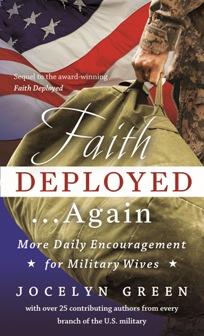
Welcome to the Faith Deployed...Again online book club, Day 15! (Not sure what this is all about? Click here.)
In Your Book: Before we begin, please turn in your copy of Faith Deployed...Again to page 204 and read "What God Has Promised" by Pamela Anderson. (If you don't have a book, don't go away! We'd love to have you join us for this discussion anyway!) Now Let's Talk: Today's discussion is led by Jocelyn Green. How many of you could relate to the first line in Pamela's devotion? She wrote:
"The man who came home wearing my husband's uniform was not the same man I had sent off to war seven months before." (page 204)
I'm sure this is true, to some degree, for every couple separated by a combat deployment. But for some--for far more than we even realize--the changes in the returning veteran are dramatic and terrifying. I wish we could say that Christians are exempt from post-traumatic stress, but we are not. Pam's husband is a chaplain. Other contributors to Faith Deployed and Faith Deployed...Again have also watched their husbands suffer PTSD: Rebekah Benimoff (another chaplain's wife), Marshele Carter Waddell, Rosie Williams, to name a few. (Also read "Not the Man I Married" on p. 72 by Rosie, and "The Roaring Lion" on p. 122 by Rebekah. You can also do a search on this Web site using these women's names to hear more about their personal experiences with their husbands' PTSD.) And I know that if we could have a show of hands somehow in cyberspace, we'd all be sobered by the number of you ladies walking through this valley right now. Maybe you, like Pam in her early days, are praying two basic prayers: "Lord where are You?" and "Please make this go away!" I think we could all understand that! That's why I am so impressed with where Pam went from there. She shares in the book:
As I slowly began to realize that I had not been abandoned by the God of steadfast love and kindness, my prayers changed. To my shame, my previous prayer life had possessed undertones reminiscent of Benjamin Franklin: "Lord, make me healthy, wealthy, and wise." Now I followed instead the prompting of Puritan pastor John Owen: "Pray only for what God has promised." On my face before the Lord, I searched the Scriptures for promises to pray.
And she found them. God promises that His love never fails. His mercy is new every morning. He hears the cries of your heart. He saves those who are crushed in spirit. All of these are His promises! Finding God's promises in Scripture and claiming them for your own life can have a huge influence on your ability to cope with the current situation. (Read Pam's entire devotion to see how she turned the promises into prayers.)
Still, the challenges are huge on a daily basis. We've talked about the foundation of faith to help us through, and now I'd like to include some very practical tips you can use, as well. I'm going to yield the rest of our discussion to Marshele Carter Waddell, the wife of a combat stress survivor with PTSD. (The following originally appeared on Marshele's own blog last October, but she is sharing it with us today, as well. We hope this sheds some much-needed light on a difficult topic!)
I had the privilege of speaking at the Worcester Institute on Loss and Trauma near Boston last week. This year’s theme was “Trauma Recovery.” I was the only speaker without a partial alphabet tagged onto my name on the program, the only keynote who spoke solely from “on-the-job training.” Needless to say, I learned much from the bigger brained, degreed presenters and furiously took notes on behalf of you, my sisters on the home front. The most nourishing morsel I gathered was during a session titled “Essentials for Safe Trauma Therapy,” by Babette Rothschild, M.S.W., L.C.S.W. (See what I mean) I sat up a bit straighter and listened more intently when she offered some very practical pointers for helping someone who is swept away in a flashback. A flashback is a memory of the past that intrudes into the present and makes the past seem as if it is actually occurring in the here and now….A flashback can occur as a slight “blip” in time or it can be a memory of an entire experience, occurring in real time just as it did in the past. A person having a flashback does not black out, does not dissociate or lose consciousness. During a flashback, a person’s trauma gets replayed with great intensity. A traumatized person may not be able to separate the flashback from the present reality. When a flashback happens during sleep, we call it a nightmare. A person’s entire nervous system is involved during a flashback. Because you and I love a combat stress survivor, many of us have witnessed our loved one experiencing a flashback. It’s not fun. It’s not predictable. It’s downright frightening. The first time I was present when my husband had a flashback, I felt scared and helpless. I was unprepared for what unfolded. The situation felt out of control, surreal, larger than any of us. I was grateful there were two other men present, both service members, to help us get to the other side of that flashback. I realize I’m preaching to the choir. I know most of you know exactly what I’m talking about. Ms. Rothschild, author of The Body Remembers, stresses the importance of “dual awareness,” the ability to know the difference between one’s internal world and one’s external reality. She emphasized that we, as family members and friends of warriors, can help diffuse flammable flashbacks by helping the veteran re-engage with the present moment. She suggested these practical steps for anyone caught in the flood of a loved one’s flashback:
- Tell the person he is having a flashback
- Tell the person to describe objects in the room
- Ask the person to count the objects in the room
- Ask the person to notice sounds in and outside the room
- Tell the person to describe the looks and expressions of others in the room
- Have the person tell you the current year, today’s date and the time
In The PTSD Workbook, author Mary Beth Williams adds the following suggestions. Tell the person experiencing the flashback to:
- Repeatedly blink his eyes hard
- Change the position of his body
- Take several deep, cleansing breaths
- Hold on to a safe object
- Wash his own face with cool water
- Clap his hands
- Stomp his feet on the floor
By engaging his/her five senses, we can help our loved who is experiencing the anxiety to recognize the present as different from the past. One of the best ways to deal with a flashback is to get your loved one outside of his head and into the world around you. The trauma survivor’s greatest need is to feel safe. There is an enormous amount of safety in living in the present. Later, after the dust has settled, be available and open to talk with your loved one about the flashback. Be ready to listen more than you talk. Be non-judgmental, but speak the truth in love. (Sources: The PTSD Workbook, by Mary Beth Williams, Ph.D., New Harbinger Publications, 2002 and The Body Remembers, by Babette Rothschild, W.W. Norton and Company, Inc., 2000)
Discuss: Do you know of other important resources for veterans with combat trauma (and/or their family members)? These could be books, Web sites, seminars, conferences, whatever. Please share! Thinking back to Pam's devotion, "What God Has Promised," please share at least one promise from the Bible that encourages you.



Add new comment